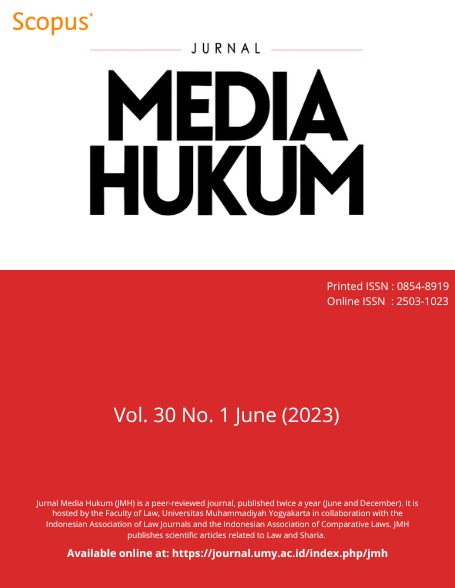State Responsibility of Afghanistan Under Taliban Regime
DOI:
https://doi.org/10.18196/jmh.v30i1.16020Keywords:
CEDAW, education rights, state responsibility, taliban regimeAbstract
Serious concerns on the rights of Afghanistan’s women and girls have been raised ever since the Taliban returned to power on 15th August 2021. This paper uses a normative methodology to investigate the discrepancy of legal argument in the international law of succession in terms of status of Taliban within the Convention on the Elimination of All Forms of Discrimination Against Women (CEDAW) framework. This paper confirmed that the Taliban is the de facto government of Afghanistan as the Taliban have effective and integrated control over a state territory and there is no competing entity with a solid constitutional claim. Therefore, the Taliban is bound by international law to guarantee that women enjoy equal educational rights, including access to school and curriculum. However, the current framework of CEDAW, including the CEDAW committee has not be able to cope with such issues, as it should be reformed in the next future.
References
Agustina, Hiqma Nur, and Tenia Ramalia, ‘Parvana’s Trilogy: A Study of Violence toward Afghanistan Women and Girls’, PALASTREN Jurnal Studi Gender, 10.2 (2018), 204–204 https://doi.org/10.21043/palastren.v10i2.2664
Amaritasari, Indah P., and Sri Bagas Sugiharto, ‘The Security Landscape from the International Law Perspectives on the New-Taliban-Afghanistan State’, Jurnal Keamanan Nasional, 8.1 (2022), 92–113 https://doi.org/10.31599/jkn.v8i1.544
Amini, Ma’ruf, and Devina Arifani, ‘The Taliban & Afghanistan: Conflict & Peace in International Law Perspective’, International Journal of Law Reconstruction, 5.2 (2021), 306–306 https://doi.org/10.26532/ijlr.v5i2.17704
Anderson, Scott R, ‘History and the Recognition of the Taliban’, LAWFARE, 2021
Ashraf, Afzal, Caroline Kennedy-Pipe, and Michael Cox, ‘Woman, War, and the Politics of Emancipation in Afghanistan’, LSE Public Policy Review, 2.3 (2022) https://doi.org/10.31389/lseppr.58
Behuria, Ashok, Yaqoob Ul Hassan, and Sanya Saroha, ‘US-Taliban Talks for Afghan Peace: Complexities Galore’, Strategic Analysis, 43.2 (2019), 126–37 https://doi.org/10.1080/09700161.2019.1595483
Blum, Robert Wm., Mengmeng Li, Omrana Pasha, Chandra Rao, and Kayhan Natiq, ‘Coming of Age in the Shadow of the Taliban: Education, Child Marriage, and the Future of Afghanistan From the Perspectives of Adolescents and Their Parents’, Journal of Adolescent Health, 64.3 (2019), 370–75 https://doi.org/10.1016/j.jadohealth.2018.09.014
Callen, Michael, Shahim Kabuli, and Michael Cox, ‘Three Sins: The Disconnect Between de Jure Institutions and de Facto Power in Afghanistan’, LSE Public Policy Review, 2.3 (2022) https://doi.org/10.31389/lseppr.57
Campbell, Meghan, and Geoffrey Swenson, ‘Legal Pluralism and Women’s Rights after Conflict: The Role of CEDAW’, Colum. Hum. Rts. L. Rev., 48 (2016), 112–112
Drucza, Kristie, and Valentina Peveri, ‘Gender in Afghanistan’s Wheat and Agricultural Literature- How to Get to Empowerment?’, Feminist Research, 2.2 (2019), 43–52 https://doi.org/10.21523/gcj2.18020202
Gunawan, Yordan, ‘Responsibility of People’s Republic of China for Minority Based on ICERD: Uyghur Case’, Varia Justicia, 15.2 (2019), 65–73 https://doi.org/10.31603/variajusticia.v15i2.3116
Gunawan, Yordan, P Y Ritonga, Mita Amelia, Siti Septiana K Harun, and Nisa Nurhofipah Ramadani, ‘Does the Protection of Minority Groups in Xinjiang Fail’, Sriwijaya Law Review, 4.2 (2020), 205–20
Hakimy, Mohammad, and Basel Rokba, ‘Human Rights Situation under Taliban (Islamic Emirate) Regime’, Innovations, 70 (2022), 36–36
Hussain, Ejaz, ‘Taliban 2.0 and Afghanistan–Pakistan Relations’, Journal of Asian Security and International Affairs, 9.3 (2022), 462–74
Indraningtyas, Anisa, and Gonda Yumitro, ‘Bibliometric Analysis of International Publications Trend on The Taliban’, Pustabiblia: Journal of Library and Information Science, 6.1 (2022), 103–24
Jackson, Ashley, and Florian Weigand, ‘The Taliban’s War for Legitimacy in Afghanistan’, Current History, 118.807 (2019), 143–48 https://doi.org/10.1525/curh.2019.118.807.143
Jain, Vanshaj, ‘To Recognise Taliban or Not? This Question Shows Poor Understanding of International Law’, The Print, 2021
Jami, Maryam, ‘The Lawless Land: How Does the Taliban’s Abolishing of Afghan Laws Affect Citizens’ Security?’, JURIST, 2022
Jhonson, Larry D, ‘Expert Backgrounder: How Can The Taliban Be Prevented From Representing Afghanistan In The United Nations?’, JUST SECURITY, 2021
Jinnah, Abdul Mohammed Ali, ‘Braving Misconceptions In The Name Of Education’, Journal of Language and Linguistic Studies, 17.4 (2022)
Khan, Alamgir, ‘Current Afghanistan Crisis: The Impact of External Factors on Internal Crisis’, Global Regional Review, VII.I (2022), 118–29 https://doi.org/10.31703/grr.2022(VII-I).13
Lone, Rahil Majeed, Samreen Naz, and Prof Sona Shukla, ‘Women under Taliban Regime: A Theoretical Perspective’, IJRAR1905208 International Journal of Research and Analytical Reviews, 2018 www.ijrar.org
Malik, Ayesha, and Rsil Associate, Paper-The Islamic Emirate of Afghanistan and the Recognition of Governments under International Law 2 Paper-The Islamic Emirate of Afghanistan and the Recognition of Governments under International Law Design: Ayesha Mushtaq, 2021
Manank Panchmtia, Manank Panchmtia, ‘The State Succession’, International Journal of Political Science, Law and International Relations, 8.3 (2018), 11–16 https://doi.org/10.24247/ijpsliroct20182
Martellucci, Cecilia Acuti, Shohra Qaderi, Tetsuya Tanimoto, and Akihiko Ozaki, ‘Afghan Women and Children’s Health: Three Main Challenges under Taliban and COVID-19’, Journal of Global Health, 11 (2021)
Modebadze, Valeri, ‘Afghanistan under Taliban: A New Regime Poses A Threat to International Stability’, Journal of Liberty and International Affairs, Institute for Research and European Studies - Bitola, 8.1 (2022), 277–91 https://doi.org/10.47305/JLIA2281277m
Mullins, Lauren Bock, ‘CEDAW: The Challenges of Enshrining Women’s Equality in International Law’, Public Integrity, 20.3 (2018), 257–72
Nehan, Nargis, and Michael Cox, ‘The Rise and Fall of Women Rights in Afghanistan’, LSE Public Policy Review, 2.3 (2022) https://doi.org/10.31389/lseppr.59
Omarzada, Ozair Ahmad, ‘The Impact of CEDAW on the Rights of Women in Afghanistan’, Journal of Asian and African Social Science and Humanities, 2.1 (2016), 81–94
Onward for Afghan Women, ‘Girls’s Education and Islam: A Devine Command with Historical Precedent.’, Georgetown Institute for Women, Peace, and Security, 2022
Öztürk, Selim, ‘The Taliban Regime in Afghanistan: En Route to International Recognition?’, Middle East Policy, 26.4 (2019), 102–12 https://doi.org/10.1111/mepo.12460
Paddeu, Federica, and Niko Pavlopoulos, ‘Between Legitimacy and Control: The Taliban’s Pursuit of Governmental Status’, JUST SECURITY, 2021
Pasarlay, Shamshad, ‘Dead or Alive?: The Taliban and the Conundrum of Afghanistan’s 2004 Constitution’, I·CONnect, 2022
Pradnyawan, Sofyan Wimbo Agung, Arief Budiono, and Jan Alizea Sybelle, ‘Aspects of International Law and Human Rights on The Return of The Taliban in Afghanistan’, Audito Comparative Law Journal (ACLJ), 3.3 (2022), 132–38 https://doi.org/10.22219/aclj.v3i3.23237
Qazi Zada, Sebghatullah, ‘Legislative, Institutional and Policy Reforms to Combat Violence against Women in Afghanistan’, Indian Journal of International Law, 59.1–4 (2021), 257–83 https://doi.org/10.1007/s40901-020-00116-x
Raqib, Mariam, and Amilcar Antonio Barreto, ‘The Taliban, Religious Revival and Innovation in Afghan Nationalism’, National Identities, 16.1 (2014), 15–30 https://doi.org/10.1080/14608944.2013.843517
Rauf, Maroof Bin, ‘Educational Challenges in Afghanistan after the Return of Taliban’, Pakistan Journal of International Affairs, 4.4 (2021)
Reuters, ‘Afghan Vice President Says He Is “Caretaker” President’, Reuters, 2021
Sakhi, Nilofar, ‘The Taliban Takeover in Afghanistan and Security Paradox’, Journal of Asian Security and International Affairs, 9.3 (2022), 383–401 https://doi.org/10.1177/23477970221130882
Saugheh, Hamed Hasyemi, and Rohaida Nordin, ‘Legitimacy as a Precondition for the Recognition of New Governments: A Case of Libya’, Sriwijaya Law Review, 2.1 (2018), 69–69 https://doi.org/10.28946/slrev.Vol2.Iss1.111.pp69-81
Saul, Ben, ‘“Recognition” and the Taliban’s International Legal Status’, International Centre for Counter-Terrorism, 2021
Shahzad, Mohd, ‘The State of Women in Afghanistan since 2001’, International Journal of Humanities & Social Science Studies (IJHSSS), 2 (2022), 252–58
Sitamala, Afandi, Ferina Ardhi C, and Ahmad Lanang C, ‘The Implementation of CEDAW Principles on Reducing Gender-Based Violence During The COVID-19 Pandemic’, Journal of Law and Policy Transformation, 7.1 (2022), 44–44 https://doi.org/10.37253/jlpt.v7i1.6724
Situmorang, Carine, ‘Studi Kasus Terhadap Mekanisme Penegakan Konvensi CEDAW Di Afghanistan Berdasarkan Hukum Internasional’, 2016
Tan, Daron, ‘Filling the Lacuna: De Facto Regimes and Effective Power in International Human Rights Law’, NYUJ Int’l L. & Pol., 51 (2018), 435–435
Tarzi, Amin, ‘Islam and Constitutionalism in the Persianate World’, Journal of Persianate Studies, 5.2 (2012), 93–94 https://doi.org/10.1163/18747167-12341239
Terpstra, Niels, ‘Rebel Governance, Rebel Legitimacy, and External Intervention: Assessing Three Phases of Taliban Rule in Afghanistan’, Small Wars & Insurgencies, 31.6 (2020), 1143–73 https://doi.org/10.1080/09592318.2020.1757916
Umarach, Maretha Syawallin, Derina Faslig Silitonga, and Humairah Muljabar, ‘Analysis of the Significant Increase of Gender-Based Violence During the Covid-19 Pandemic in the Conflict Zone: The Case of Afghanistan’, Journal of Islamic World and Politics, 6.1 (2022), 1–19
United Nations, Responsibility of States for Internationally Wrongful Acts (2001), 2001
United Nations High Commissioner for Human Rights, ‘Situation of Human Rights in Afghanistan’, UN Human Rights Council, 2022
United Nations Office for the Coordination of Humanitarian Affairs, ‘Afghanistan: UN Committees Urge Taliban to Honour Their Promises to Protect Women and Girls’, Reliefweb, 2021
Van Essen, Jonte, ‘De Facto Regimes in International Law’, Merkourios-Utrecht J. Int’l & Eur. L., 28 (2012), 31–31
Vöhringer, Marco, ‘ICC Prosecutions as an Alternative to State Responsibility for Taliban Crimes’, Verfassungsblog on Matters Constitutional, 6 April 2022 https://verfassungsblog.de/balancing-accountability-and-legitimacy/
Weigand, Florian, and Michael Cox, ‘Why Did the Taliban Win (Again) in Afghanistan?’, LSE Public Policy Review, 2.3 (2022) https://doi.org/10.31389/lseppr.54
Yount, Kathryn M., Patricia C. Lewis, Cari Jo Clark, Lori Heise, Ruchira T. Naved, and Lauren Maxwell, ‘Development and Validation of the LoVI: The Laws on Violence against Women and Girls Index’, BMC International Health and Human Rights, 20.1 (2020), 13–13 https://doi.org/10.1186/s12914-020-00233-z










